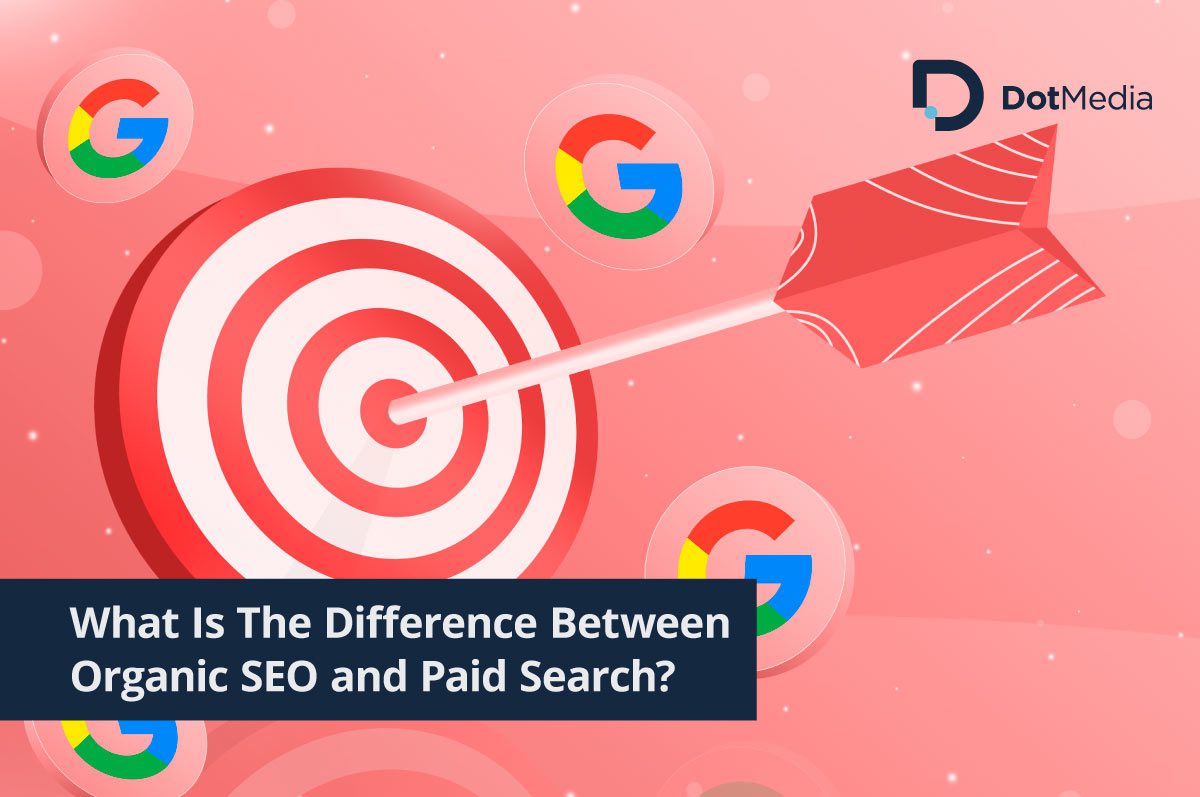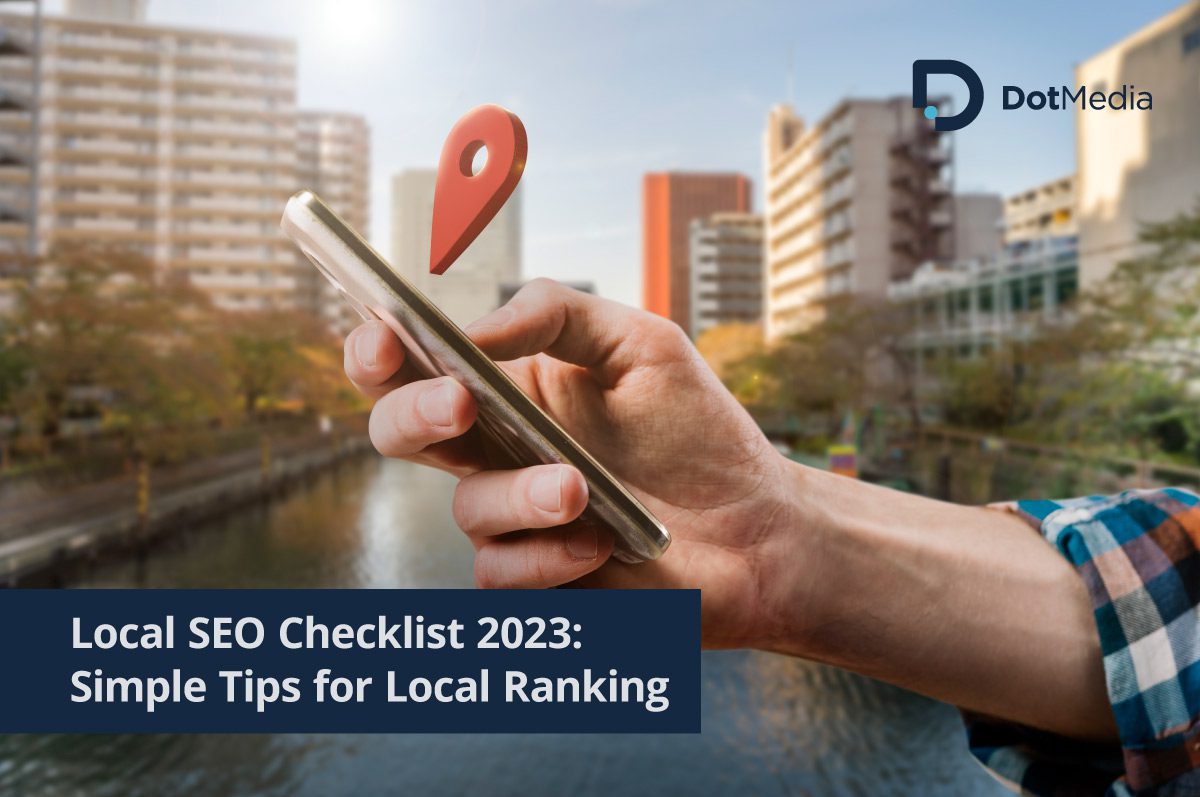What Is The Difference Between Organic SEO and Paid Search?
Are you trying to improve your website’s search engine ranking but unsure if you should invest in organic or paid SEO? It can be overwhelming to navigate the world of search engine optimisation, and understanding the difference between these two approaches is crucial. Organic SEO and organic traffic focus on optimising your website to rank higher organically through techniques like keywords and backlinks, whereas paid SEO involves paying for ads that appear at the top of search engine results. In this post, we’ll break down the key differences between organic and paid SEO so that you can decide which approach is right for your business.
What is SEO?
Search Engine Optimisation, or “SEO” for short, is improving the visibility and ranking of a website or web page in search engine results pages (SERPs). It is a subset of digital marketing, which includes other strategies like pay-per-click (PPC) advertising, social media marketing, and content marketing.
While many factors go into SEO, the main goal is to increase the quantity and quality of traffic to a site from organic search results. This can be done through on-page optimisation (which refers to optimising individual web pages to rank higher in SERPs) and off-page optimisation (link building and other activities that improve a site’s authority).
Organic SEO generally takes longer to see results than paid SEO, but it is also considered more sustainable and effective in the long run. Paid SEO typically involves using PPC ads, which can quickly increase visibility and traffic but may not be as effective in the long term.
What is Organic SEO?
Organic SEO is the process of optimising a website for Google search to earn higher web traffic levels and improve the site’s visibility and gaining more organic search traffic.
Paid Search, on the other hand, is the process of paying Google or another search engine for advertising space on their SERP (Search Engine Results Page). Paid Search aims to earn a higher ranking on the SERP for specific keywords or key phrases that are relevant to your business.
The main difference between organic and paid SEO is that organic SEO is free, while paid SEO requires you to pay for advertising space. However, both processes require time and effort to be successful.
What is Paid Search / Search Ads?
Paid search, also known as pay-per-click (PPC) advertising, is an online marketing strategy that allows companies to pay search engines to place their ads higher up on relevant search engine results pages (SERPs). This type of digital marketing strategy can help businesses reach a larger audience and bring more website visitors, potential customers, and ultimately, greater profits.
The goal of paid search is to drive traffic to the advertiser’s website. The process works by bidding on certain keywords or phrases related to the company’s products or services. When a user searches for those terms, the company’s ad will appear at the top of the SERPs. The company pays each time a user clicks on the ad and is directed to the website.
There are several advantages to using paid search advertising. First, it allows companies to target specific keywords and phrases that are related to their products and services. It also helps them reach a broader audience than traditional marketing methods. Additionally, it provides an opportunity to measure ROI and track performance in real time.
Although paid search can be a powerful tool for driving traffic and increasing sales, it’s essential to understand how it works and how to make the most of it. Companies need to have a well-thought out plan that includes researching popular keywords, setting a budget, and tracking results. It’s also important to consider other elements of digital marketing such as SEO, content marketing, and social media to create an effective online presence.
The Benefits of Organic SEO
Organic SEO is the process of optimising a website to rank higher in search engine results pages (SERPs) and traffic from search engines. Paid SEO is the process of paying for ads that appear on SERPs. Both organic and paid SEO have their advantages and disadvantages.
Organic SEO is advantageous because it is free and it can help you rank higher in SERPs for long-term keywords. However, the main disadvantage of organic SEO is that it takes longer to see results than paid SEO.
Paid SEO is advantageous because it can help you achieve quick results. The main disadvantage of paid SEO is that it can be expensive, and you may not always get your money’s worth if your ads do not result in clicks.
The Benefits of Paid Search
As the name suggests, paid SEO is when you pay for your website to rank higher in search engine results pages (SERPs). This can be done through paying for ads, paying for inclusions in directories, or paying an SEO consultant to optimise your website.
The main benefit of paid SEO is that it can help you to achieve quick and tangible results. If you want your website to rank higher in SERPs quickly, then paid SEO is undoubtedly an option worth considering. It can also be an excellent way to supplement organic SEO efforts, helping to push your website even further up the rankings.
Of course, as with anything, paid SEO has some downsides. The most obvious one is that it can be expensive – especially if you’re paying for ads or an SEO consultant. There’s also no guarantee of results, so it’s essential to carefully consider whether paid SEO is right for your business before investing any money.
The difference between Organic and Paid search
Organic SEO is optimising a website to rank higher in search engine results pages (SERPs) without paying for placement. Paid search is the process of paying for placement in SERPs.
The main difference between organic and paid SEO is that organic SEO is free, while paid SEO costs money.
Organic SEO can take longer to achieve results than paid SEO, but the results of organic SEO are more sustainable because they are not paid for and, therefore not at risk of disappearing as soon as the payment stops.
Paid SEO can provide faster results, but these results are not guaranteed to last and may stop as soon as the payments do. In addition, paid SEO typically requires a continuous budget to maintain results, while organic SEO does not have this same requirement.
Are keywords important in organic and Paid Search?
Keywords are essential for both organic and paid search. In fact, they are the foundation of any successful SEO or PPC strategy.
Organic search relies heavily on keyword research to identify relevant terms and phrases to drive organic website traffic. Keyword research involves discovering which keywords people use when searching for a particular product or service. This data can be used for PPC campaigns as well, allowing you to determine which keywords will be most effective in driving conversions.
When it comes to developing an effective SEO strategy, keyword data is essential for understanding how users search for your product or service and what keywords they use. This information can be used to craft content that targets specific keywords and phrases and optimise existing content. By focusing on certain keywords, you can ensure that your content will rank high in the rankings in search results pages (SERPs) and bring more organic traffic to your website.
For paid search, keywords also play an important role. By targeting specific keywords with your ads, you can ensure that your ads will appear in front of the right audience. In addition, keyword data from organic search can also help you develop PPC campaigns that target those same keywords. With this data, you can create ads that specifically address the needs of those users and offer them a tailored experience.
In short, keywords are an integral part of both organic and paid search. Good keyword research will allow you to identify the best terms and phrases to target with your content and PPC campaigns, allowing you to maximise your visibility in search engine results and drive more targeted traffic to your site.
What is a search engine algorithm?
A search engine algorithm is a set of formulas and rules used to determine the relevancy and quality of a particular web page or advertisement in relation to the user’s query. The algorithms are designed to ensure that the most relevant and highest quality content is provided in response to the question. In other words, the algorithms are designed to maximise user experience on the search engine platform.
The most popular search engine algorithm is Google’s, which is reportedly changed hundreds of times each year. These changes, or updates, can significantly impact search engine marketing (SEM) campaigns. The majority of these changes are minor, but major updates can dramatically affect the performance of SEM campaigns.
Google’s algorithm includes a number of factors when determining the relevancy and quality of a web page or advertisement, such as: relevant keywords, website quality and user experience, overall website content, backlinks, page speed, mobile-friendliness, local search optimisation, structured data/schema, buyer intent, markup, and more. Understanding all of these factors is essential for any successful SEM campaign.
Search engine algorithms are constantly evolving and becoming more sophisticated. For digital marketers, keeping up with algorithm changes is essential for staying ahead of the competition and ensuring their campaigns are optimised for the best possible results.
Do backlinks still play an important role in SEO?
Yes, backlinks still play an important role in SEO. Backlinks are one of the most important ranking factors for search engines like Google. Backlinks are essentially links from other websites or domains that link to your website. This demonstrates to search engines that your website is of a high-authority and is relevant to the content on other websites.
When search engines recognise that your website is linked to from other websites with high-authority, it can help your website rank higher in search engine results pages (SERPs). Search engines use backlinks as a way to assess the relevance and authority of your website. For example, suppose other websites with high domain authority are linking to your website. In that case, it shows that your website is of a good quality and is considered to be authoritative by other websites.
Backlinks also provide additional information to search engines that can be used to determine your website’s relevance in SERPs. This includes the anchor text of the backlink, which can provide more context as to what the content of your website is related to. Additionally, the number of backlinks to your website will also be considered, as this can provide further evidence of your website’s authority and relevance.
Therefore, backlinks are still an important factor for SEO and should not be overlooked. However, to ensure that your website is getting the maximum benefit from backlinks, it is important to focus on building quality links from high-authority domains and make sure that your content is up-to-date and relevant to the topics being discussed.
Statistics around the difference between Organic SEO and Paid Search
Organic SEO is a longer-term process that takes time to gain visibility in search engine rankings. On the other hand, Paid search is more immediate and can be used to get quick results in search engine rankings.
Recent studies have revealed some interesting statistics about organic vs paid search. According to research, 70-80% of all searchers ignore paid ads and focus on organic results only from their search query. Meanwhile, paid advertising gains 150% more engagement than organic search. Additionally, organic search leads typically have a 14.6% close rate, compared to 1.7% for outbound marketing leads.
When it comes to website traffic, organic search drives 53% while paid search drives 27%. B2B and technology companies generate twice as much organic search revenue as they do from paid search. These statistics are important to consider when determining which type of search is right for your business.
Looking ahead to 2023, organic and local search differences remain significant. Local SEO has a geographical component and is part of Google Maps, while SEO focuses on getting traffic from organic search, and PPC focuses on getting traffic from paid search, social, and display.
Overall, it’s clear that organic search provides long-term benefits and can be used to build a strong foundation for any business, while paid search can help to achieve quick results in search engine rankings. With this in mind, businesses should weigh the pros and cons of both search types, and choose the one that fits their goals and marketing budget best.
Whats best for business to business – Organic SEO or Paid Search?
Regarding business-to-business (B2B) marketing, a combination of organic SEO and paid search (such as Google Ads) is your best bet to reach the right people and get the most out of your efforts. Organic SEO involves optimising your website and content for search engines like Google, so your content appears higher in search results. This helps you get more visibility and can help attract more potential customers to your business.
Paid search, on the other hand, involves setting up ads on search engines or other platforms. This allows you to target specific keywords, so you can reach users who have already shown an interest in products or services similar to yours. Paid search also gives you greater control over the timing and placement of your ads, which can be incredibly useful for B2B marketing.
Both organic SEO and paid search offer unique advantages regarding B2B marketing. Organic SEO can help you build a strong foundation by ensuring your content is being seen, while paid search allows you to target specific users cost-effectively. By combining the two strategies, you can get the best of both worlds – the brand visibility of organic SEO and the targeted reach of paid search.
Where best to start for PPC advertising for business?
When it comes to PPC advertising for business, the best place to start is by researching and setting up your keywords. You’ll want to create different ad groups and add related keywords to each to ensure they’re highly relevant to your ads. This will help you get the most out of your PPC advertising efforts and maximise your ROI. Additionally, you should take advantage of the many online resources to help you better understand the basics of PPC. Two such sources include the HubSpot Marketing Blog’s Ultimate Guide to PPC Marketing and Forbes’ PPC Advertising: The Ultimate Guide. Both guides offer invaluable insight into the fundamentals of PPC and can help you get off on the right foot with your own PPC campaigns.
How does content marketing fit in with Organic SEO?
Content marketing is an essential component of any organic SEO strategy. Content can help improve your website’s visibility in search engines and attract more potential customers to your business.
When it comes to content marketing, the key is to create high-quality, original, and relevant content that provides value to your target audience. This could include blog posts, videos, infographics, podcasts, ebooks, case studies, and more. By creating content around topics that are related to your industry, you can help your website rank higher in search engine results pages (SERPs) and also establish yourself as a thought leader in your industry.
SEO-focused content also plays an important role in link building, which is another key element of organic SEO. Creating content that links to other reputable sources can build up your website’s authority and get higher rankings in SERPs.
Overall, content marketing is an essential part of any organic SEO strategy. By creating high-quality content that provides value to your target audience and building up your website’s backlinks, you can improve your website’s visibility and reach more potential customers.
Is SEO still important even with the rise of Ai?
Absolutely. Search Engine Optimisation (SEO) is a very important and powerful digital marketing strategy that should not be overlooked. With the rise of AI, SEO will change with time and new technologies. AI provides an excellent tool for data analysis in SEO, allowing for faster, more accurate and more efficient keyword analysis, technical site audits, and the discovery of trending topics and content gaps.
However, SEO strategies still require expertise and creativity on the part of professionals, which AI simply cannot replace. Therefore, SEO remains an essential part of digital marketing and should be included in any digital marketing strategy.
How important is content for SEO?
Content is incredibly important for SEO. Without content, search engines won’t be able to correctly index your pages and help them rank. Content provides the information that search engines need to understand their relevance to specific queries and display them on the search engine result page (SERP). It also helps build credibility and trust with your audience, as well as establish authority on a particular topic.
Content can come in various forms, such as blog posts, videos, infographics, and more. Each form of content should have an optimised meta title and description, as well as targeted keywords that match users’ searches. This helps search engines understand the relevance of the content and accurately display it across SERPs. Quality content is also essential, as it encourages readers to stay longer on your website and encourages them to share your content on social media, which helps with link building and organic traffic.
Overall, content plays a critical role in SEO because it gives search engines the data they need to understand the relevance of your website and rank it accordingly. Quality content also establishes authority and builds trust with your audience while helping to increase organic traffic and visibility.
What is Search intent?
Search intent refers to the underlying reason behind a user’s search query on a search engine. It is the primary objective or purpose behind why a user types in a specific keyword or phrase into a search engine like Google. Understanding search intent is crucial for developing content that caters to the user’s needs and meets their search query.
There are four main categories of search intent:
- Informational intent: Users intend to seek specific information about a topic. Examples of such queries include “how to make a cake” or “what is the capital of France”.
- Navigational intent: Users have a navigational intent when they seek a particular website or webpage. Examples of such queries include “Facebook login” or “Amazon Prime Video”.
- Transactional intent: Users have a transactional intent when they search for a product or service to buy. Examples of such queries include “buy Nike running shoes” or “hotel deals in Paris”.
- Commercial investigation intent: Users have a commercial investigation intent when they’re looking to purchase a product or service in the near future, but they’re still researching their options. Examples of such queries include “best smartphones 2023” or “top-rated laptops for video editing”.
Understanding the different types of search intent can help you create content that addresses the user’s needs and satisfies their search query. For instance, if a user is searching for information on how to bake a cake, you could create a blog post that offers a step-by-step guide on baking a cake. Similarly, if a user is searching for hotel deals in Paris, you could create a landing page that highlights your hotel’s unique features and discounts.
Ultimately, grasping search intent can help you produce content that ranks better on search engine results pages (SERPs) and generates more traffic to your website. By providing value to your users and addressing their search queries, you can create trust and establish credibility with your audience, leading to more conversions and revenue for your business.
Conclusion – What Is The Difference Between Organic SEO and Paid Search?
In conclusion, organic search engine optimisation and paid search engine are both important elements in achieving strong digital marketing results. Organic SEO allows you to build a long-term presence in the SERPs while paying attention to user experience and content quality, while paid SEO can be used for quick wins and traffic boosts. Both strategies require careful planning and implementation of tactics that will give your website the best chance of success. Knowing when to use each approach is key to developing an effective overall SEO and Organic search strategy.





